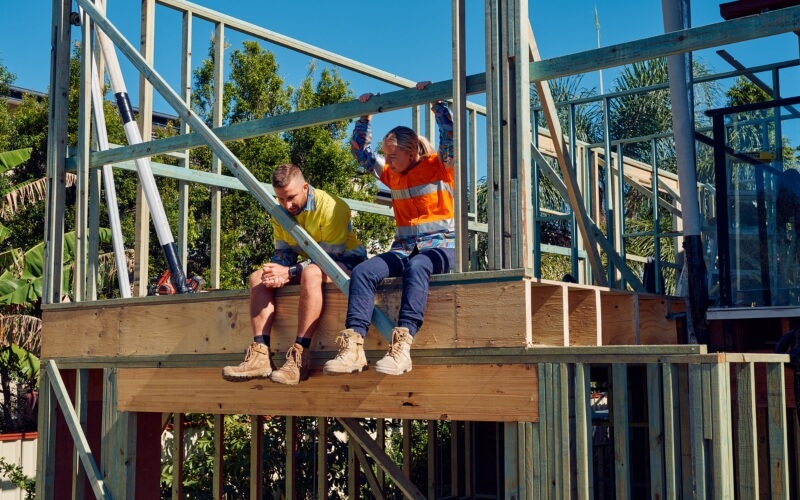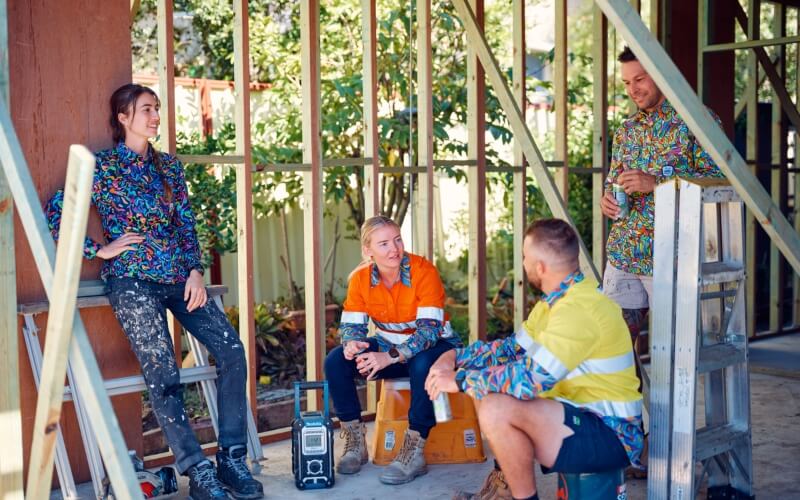Equipment for Hire
Equipment for Hire
Engineering Solutions
Engineering Solutions
Industrial Solutions
Industrial Solutions
Power & HVAC
Power & HVAC
How mentally healthy is your work site?
A practical guide to improving the mental health and wellbeing of your construction workforce
It’s hard not to think and talk about mental health, with national events like R U OK? Day and Mental Health Month keeping this issue top of mind. But for 1 in 5 working Australians1, mental ill-health remains a challenge all year-round.
“Mental health affects many different aspects of our life, including our safety and wellbeing at work,” says Luke Pedras, National Manager for Health, Wellbeing and Injury Management at Coates. “For high-risk blue collar professions – like tradies, truckies and farmers – a high stress load creates even greater risk of mental ill-health or injury at work.”
Did you know that:
-
The Australian construction industry loses 1 worker to suicide every 2 days2
-
Males are 3 times3 more likely to take their own life and account for 88%4 of the construction workforce
-
Construction apprentices are 2.5 times5 more likely to commit suicide than other young men their age
As well as impacting individuals, mental ill-health also affects business productivity. A recent Safe Work Australia report6 confirms that on average, work-related psychological injuries have longer recovery times, higher costs, and require more time away from work.
Use this guide to learn about the psychosocial hazards that affect your construction business; to understand your responsibility as an employer; and for tips on improving the mental health and wellbeing of your workforce.
What puts construction workers at risk?
A psychosocial hazard is anything that can cause psychological harm, which for construction workers can include high job demands, bullying, a perceived lack of support and exposure to traumatic events.
“You’ll often see people putting in long hours to meet high job demands and tight deadlines, or battling the insecurity of project-based work,” says Luke. “Construction can also be physically demanding and require people to work within environments with little or no protection from the elements. While most employers do their best to manage these issues, ongoing exposure can put people at physical and psychological risk.”

1 in 5 Australians have had a year-long mental health disorder. Image credit: TIACS
What is your responsibility as an employer?
In April 2023, significant legislative changes designed to improve the health and safety of Australian workplaces, took effect. The revised Commonwealth WHS laws strengthen the requirement for employers to proactively identify and manage psychosocial risks in the workplace. The Code of Practice for Managing Psychosocial Hazards at Work offers guidance, or you can read more about your responsibilities via Comcare.
Building mentally healthy workplaces
In any industry, there are pressures and conditions beyond your control. Improving the mental health of construction workers, in spite of these challenges, requires an environment where people feel supported, valued and heard – even when demands and expectations are high.
“Employers must focus and talk openly and honestly about all aspects of employee health,” says Luke. “To promote these conversations, the Coates Foundation is proud to partner with TIACS – a free, confidential and professional mental health counselling service for blue collar workers and their loved ones, right around Australia.”
Supportive work culture
According to TIACS Co-CEO, Jason Banks, to nurture mentally healthy workplaces people must feel safe to share their story and to speak up when things aren’t right. “Leading by example, with vulnerability, and talking about what you’re going through allows others to do the same,” he says. “This work culture also normalises the health-seeking behaviours that allow people to care for their mental and physical health.”
Listening
It’s normal to have the occasional bad day, but when patterns start forming it can suggest more is going on. “We spend almost a third of our time at work, so as colleagues, we are well-placed to pick up on the early warning signs,” says Jason. “If you think someone is having a hard time, you can make a big difference just by asking how they are and listening to what they have to say. You can also point people towards support internally, through an EAP (Employee Assistance Program) or an external counselling service.”
Building relationships
To create mentally healthy workplaces, people need to feel connections with their managers and peers, but the project-based nature of construction can limit the ability to build these relationships. “There’s value in creating opportunities, inside and outside of work, for employees to bond,” says Luke. “Coates often comes together to support charitable events, like the Perth Telethon and Mission Australia’s Christmas Appeal. These are great for building relationships at all levels and to have the conversations you can’t always have at work.”

TIACS is a free and confidential mental health counselling service for blue collar workers. Image credit: TIACS
Breaking down barriers to mental health
There’s a lot of stoicism in blue collar industries which makes it even more important to address the barriers that stop people from getting the help they need. “We know how much courage and strength it takes to show vulnerability, so we work hard to remove these social barriers by raising awareness and making it OK for people to share their story,” says Jason. “Working long hours or in remote locations can be physical barriers to getting support, and often people won’t seek help if it means driving to a GP and asking for a mental healthcare plan or talking face-to-face with a psych. Getting help from TIACS is just a text message or phone call away.”
Cost can also put professional help beyond reach, and providing an entirely free service is particularly important when financial stress is something that people are dealing with.
Helping yourself to help others
When we focus on our physical health or the health of others, often our own mental health gets put on the back burner. “It’s important to check in with your mates, but we also encourage people to check in with themselves,” says Jason. “Because we can’t help others to fill their cup up if our own cup has been drained.”
Find out more about TIACS.
If you or someone close to you is experiencing a mental health emergency or is at immediate risk of harm, call triple zero (000).
Sources
1ABS National Study of Mental Health and Wellbeing, 2020-2022
3AIHW Suicide and Self-Harm Monitoring Data
4The NAWIC Journal 2024 (page 5)
5AICD: What's the key to better health and safety in the construction sector?
6Safe Work Australia Data Report: Psychological health and safety in the workplace report
SHARE THIS ARTICLE
By submitting this enquiry you agree to Coates's Communications Terms & Conditions